Educationists, life style gurus and business management experts have suddenly discovered that without well-developed life skills, even the brightest and best students are doomed to shallows and misery. However there’s considerable confusion about the type of life skills that need to be taught in the country’s education institutions - Dilip Thakore & Summiya Yasmeen
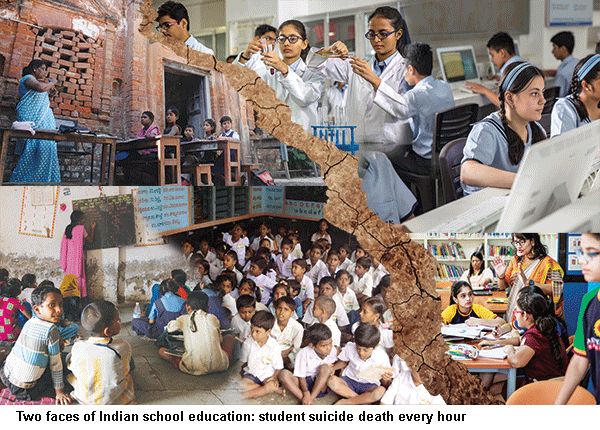
These days a parent, visitor or journalist checking out new genre international, well-ranked private or aspirational K-12 schools needs only to walk into the headmaster’s office to be informed that his school prides itself on dispensing life skills education to its students.
Even if belatedly, life skills has become the new mantra of education, not only in India, but worldwide. Educationists, life style gurus and business management experts have suddenly discovered that without well-developed life skills, even the brightest and best students are doomed to shallows and misery.
However within educationists, lifestyle gurus and the growing global community of wisdom dispensers — may their tribe increase — there’s considerable confusion about the type of life skills that need to be taught in the country’s schools, colleges and higher education institutions. Some advocate the importance of supplementary skills such as public speaking, digital learning, math wizardry. Others focus on hands-on skills such as motor mechanics, carpentry, home electronics, yoga, music, dance and sports specialisation, while some give importance to plain good manners. Understandably, parents and students are confused.
Life skills were highly valued in the post-Renaissance centuries right up to the industrial revolution. Writers of the Renaissance era and the European enlightenment such as Shakespeare, Balzac, Voltaire and Jane Austen demonstrated that upward social mobility was impossible without fine speech, cultivated tastes in music and dance, and courtly manners. However, after the industrial revolution of the 18th and 19th centuries, life skills learning declined in importance as advancement of technical and business management skills — capability to mobilise land, labour and capital to leaven with enterprise — assumed greater significance and high accomplishment in science, mathematics, engineering and management became the prerequisites of upward socio-economic mobility.
In the new millennium, resurgent interest and renewed emphasis on life skills education has been prompted by economic liberalisation, rising world trade and emergence of a global market — thanks to the quiet work of the World Trade Organisation — for goods and services. Consequently cultural sensitivity to people and lifestyles around the world has become very important.
Although the great majority of headmasters/principals of unranked schools and colleges — and their unfortunate students — are unaware, the days of intensive academic learning and excessive deference to white Caucasians while putting down Africans and South-east Asians are over. In its broadest sense, life skills education is about practising creativity, innovation, good manners, cultural sensitivity and developing interpersonal relations with a cross-section of people of all colours, ethnicities and cultures. And arguably, developing lasting international friendships over a few drinks, a game of billiards or a round of golf.
At its annual 2016 conference in Davos, the World Economic Forum released its The Future of Jobs Report which highlighted the employment, skills and workforce development strategies of the future. The report, based on interviews with chief human resources and strategy managers of leading global corporates, listed Top 10 skills that will be vital to succeed in workplaces of 2020. They include problem-solving, critical thinking, creativity, people management, emotional intelligence, judgement and decision-making, service orientation, negotiation skills and cognitive flexibility.
Addressing delegates at the World Economic Forum 2018 at the same venue two years later, Chinese billionaire business magnate, philanthropist and chairman of the online behemoth Alibaba Group (annual revenue: $22.9 billion or Rs.15.5 lakh crore), Jack Ma stressed the importance of life and soft skills education for success in jobs of the new millennium. “Everything we teach should be different from machines. If we do not change the way we teach, 30 years from now we will be in real trouble. We need to teach our children values, believing, independent thinking, teamwork, care for others. These are soft skills that conventional knowledge will not teach you,” he warned.
Regrettably, while professing to provide their students all-important life skills education, most school and undergrad college principals have at best a hazy idea of the type of life and especially soft skills students need to be equipped with in the new and fast-globalising world. In particular, upmarket schools in India which employ large numbers of low-paid cooks, bearers, gardeners, electricians, dormitory bedders etc in boarding schools, provide children/students few opportunities to learn to fend for themselves. Indeed, it’s quite normative for alumni of the country’s top-ranked day and boarding schools and colleges to be unable to change a light bulb, discern a burnt fuse or change a punctured car tyre. Moreover, elementary everyday manners aren’t taught, especially in government schools. For instance, it’s rare for educated citizens to greet public servants such as bus conductors, bank tellers, postmen etc with a ‘good morning’ or use pleasantries such as ‘please’ and ‘thank you’.
The neglect and failure of examination boards to include the teaching of formal good manners in syllabuses — routinely dismissed by left intellectuals who dominate the academy as bourgeois affectation — and of most school managements to include it in the curriculum, has been compounded by mismanagement of post-independence India’s economy by successive governments at the Centre and in the states. Ignoring the subcontinent’s millennia-old tradition of private enterprise and free markets, the Soviet-inspired centrally planned socialist model of economic development was adopted which quickly transformed the country into an economy of endemic shortages. Consequently over the past seven decades, people of India have become an anxious citizenry, habituated to pushing and shoving to get to the top of queues, in case supplies or accommodation (in public transport) run out, an ill-mannered national characteristic compounded by almost total neglect to teach civic responsibilities and good manners in primary-secondary schools.
Poor life and soft skills, bad manners and loutish behaviour of the country’s government and industry representatives have cost the country dear. It’s hardly a coincidence that none of India’s neighbour countries appreciate the moral and material support that Big Brother India often generously provides them. In confidence, industry leaders and diplomats recount numerous stories describing high-handed and boorish behaviour of Indian politicians and bureaucrats towards representatives of smaller countries, which has lost the country lucrative business contracts. Moreover, the blatant racism, colour prejudice and hostile manners of Indians towards students and visitors from African nations, have not only made life difficult for people of the Indian diaspora in Africa, but have lost the nation inestimable goodwill and respect in the black continent.
Our education system’s neglect to teach soft skills such as respectfulness, anger management, temperate speech, harmonious behaviour and conflict resolution to students in the great majority of the country’s 1.40 million schools, 39,000 undergrad colleges and 800 universities is also fanning flames of anger rooted in caste, religion and class animosities going back hundreds of years within this multi-cultural, multi-lingual and multi-religious country.
“Inadequate attention to life skills and conflict resolution education in school curriculums is fanning dangerous waves of hyper nationalism, xenophobia and Hindutva-inspired intolerance in the country. During the past six decades, our school and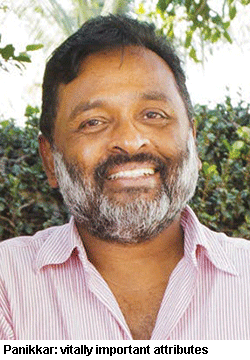 parent communities have been obsessed with academic performance to the detriment of developing soft skills of children. Conflict resolution and learning to live and work in harmony with people of different religions, castes, and ideologies are vitally important attributes for personal, workplace and national happiness. They need to be integrated into school pedagogies and practice, so that these skills and dispositions permeate the larger culture of society and become the norm for everyday behaviour. Doing so may well make the difference between a society at peace and one constantly in danger of slipping into violence and chaos,” warns Ashok Panikkar, an alum of the National Institute of Design, Ahmedabad and University of Massachusetts (USA), and founder of Meta-Culture (estb.2006), a Bangalore/Washington-based Ngo which offers conflict resolution and mediation skills training to schools and corporates.
parent communities have been obsessed with academic performance to the detriment of developing soft skills of children. Conflict resolution and learning to live and work in harmony with people of different religions, castes, and ideologies are vitally important attributes for personal, workplace and national happiness. They need to be integrated into school pedagogies and practice, so that these skills and dispositions permeate the larger culture of society and become the norm for everyday behaviour. Doing so may well make the difference between a society at peace and one constantly in danger of slipping into violence and chaos,” warns Ashok Panikkar, an alum of the National Institute of Design, Ahmedabad and University of Massachusetts (USA), and founder of Meta-Culture (estb.2006), a Bangalore/Washington-based Ngo which offers conflict resolution and mediation skills training to schools and corporates.
Although life skills education — an amorphous word interpreted variously by education leaders and principals — has emerged as a fashionable buzzword in progressive schools fairly recently, policy formulators and informed educationists within the country have been aware of its importance for some time now. For instance, the National Curriculum Framework 2005, a brilliant document drafted by Dr. Krishna Kumar, until recently professor of education at Delhi University, recommended life skills teaching to all school examination boards and managements. “Development of life skills such as critical thinking and coping and self-management skills… is very critical for dealing with the demands and challenges of everyday life,” it said. Unfortunately, this a mong its other recommendations has been practised more in the breach than observance, and academic learning rewarded by testing memorisation skills continues to remain the obsession of the country’s 34 school examination boards, and consequently of the teachers’ community.
mong its other recommendations has been practised more in the breach than observance, and academic learning rewarded by testing memorisation skills continues to remain the obsession of the country’s 34 school examination boards, and consequently of the teachers’ community.
Meanwhile, expert opinion worldwide is veering around to the view that while academic education is undoubtedly important, life skills learning may be even more crucial. “The jobs market is changing rapidly, requiring workers to develop skills such as collaboration, communication, creativity and critical thinking to function effectively in a global economy dominated by smart machines. These skills are important requisites for learning and becoming effective citizens,” says David Ross, the Washington-based CEO of Partnership for 21st Century Learning, a coalition of corporate and education leaders.
According to Ross, the partnership has developed a framework with inputs from teachers, educationists, and business leaders to define the skills and knowledge students need to shape the future of their work, life and citizenship. The framework also highlights the support systems needed for teaching the life skills necessary for success in the new millennium. “At the core of 21st century learning and innovation skills, are the 4Cs — collaboration, critical thinking, creativity and communication. Others are information, media and technology skills, life and career skills, and the knowledge learners need to be successful. I would like to stress that these skills are not just important in the classroom or workplace. They are skills we all need to be successful members of our communities and nations,” he says.
In India which is neither at peace with its neighbours nor with itself and where historical problems remain omnipresent, there’s rising clamour for education that infuses critical thinking and problem-solving skills into the leaders of tomorrow and equips them to practice peace, harmony, tolerance and everyday civic manners.
In response to this felt need, in 2012 EducationWorld included life skills and conflict management as one of the 14 parameters on which the country’s Top 1,000 primary-secondary schools are assessed and ranked in three broad categories (day, legacy boarding and international) and further sub-categories (all-girls, all-boys, co-ed), and ranked inter se (vide EW September 2017 on www.educationworld.in). The objective of including life skills education and conflict management as an important parameter for evaluating schools is to generate awareness of the importance of consciously teaching important life skills and/ or integrating them into school curriculums.
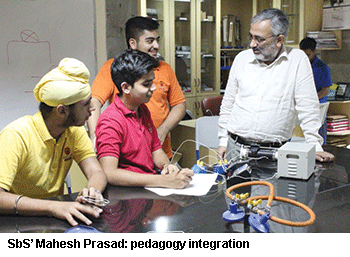 Fortunately, a handful of prescient, avant garde school leaders are purposefully teaching life skills education. In the Noida-based, K-12 Step by Step School (SbS, estb. 2008) ranked India’s #1 co-ed day school and #1 on the parameter of life skills and conflict management among all day school countrywide (see table p.44), life skills education has been integrated into all classroom curriculums, according to Dr. Mahesh Prasad, the learned (science, psychology and education postgrad, Delhi University) principal of SbS.
Fortunately, a handful of prescient, avant garde school leaders are purposefully teaching life skills education. In the Noida-based, K-12 Step by Step School (SbS, estb. 2008) ranked India’s #1 co-ed day school and #1 on the parameter of life skills and conflict management among all day school countrywide (see table p.44), life skills education has been integrated into all classroom curriculums, according to Dr. Mahesh Prasad, the learned (science, psychology and education postgrad, Delhi University) principal of SbS.
“We believe the purpose of education is to prepare children for life, not careers. Therefore, life skills education is integral to all we do in and outside classrooms. Although we don’t conduct special classes, we have consciously integrated important life skills into our pedagogies. For instance critical thinking, collaboration, team work, etc are woven into classroom lessons, and creativity and communication into co-curricular activities such as theatre and debate. Moreover, our institutional culture is of open communication and dialogue where diverse viewpoints and opinions are encouraged and respected. Unfortunately, life skills education is generally ignored in most education institutions. That’s why we have the problem of cognitively bright graduates who are either unemployable or don’t do well in their chosen careers and vocations because they lack vitally important life skills for workplace success,” says Prasad, former principal of Noida’s Army Public School, who signed up as principal of SbS in 2013.
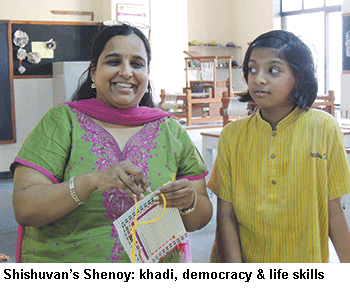 Another K-X institution where life skills education is accorded high importance is the low-profile Shishuvan School, Matunga, Mumbai (estb. 2000) which is co-ranked #1 among all day schools countrywide on the parameter of life skills and conflict management in the EducationWorld India School Rankings 2017-18. At Shishuvan, academic learning apart, students are prepared for success in their chosen careers, vocations and life’s challenges through a specially designed “khadi, democracy and life skills” programme, says Subhadra Shenoy, principal of the school.
Another K-X institution where life skills education is accorded high importance is the low-profile Shishuvan School, Matunga, Mumbai (estb. 2000) which is co-ranked #1 among all day schools countrywide on the parameter of life skills and conflict management in the EducationWorld India School Rankings 2017-18. At Shishuvan, academic learning apart, students are prepared for success in their chosen careers, vocations and life’s challenges through a specially designed “khadi, democracy and life skills” programme, says Subhadra Shenoy, principal of the school.
“In Shishuvan, we continue to be inspired by the Gandhian education philosophy. Therefore, our khadi curriculum introduced in class IV trains students to use the charkha and weave cloth. The life skills curriculum for classes VII-X trains students in a range of vocational skills such as electrical repairs, gardening, carpentry, cooking etc, while the democracy curriculum encourages dialogue and debate on a wide range of socio-economic issues. Moreover, faculty-student informality is encouraged — teachers and students address each other by first names — and students are encouraged to develop listening skills, debate respectfully, experiment and innovate, and take independent decisions. I believe our strong emphasis on life skills has contributed hugely to our students’ excellent academic outcomes, and social and emotional development,” says Shenoy, a graduate of Mumbai University, who signed up with Shishuvan in 2008 and was appointed principal in 2014.
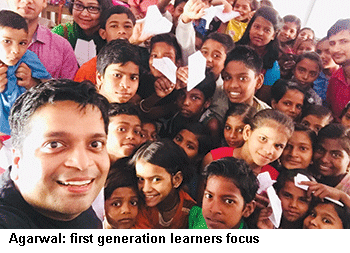 With rising awareness that academic accomplishment needs to be augmented with deliberate teaching and learning of important life skills, it’s unsurprising that companies, firms and businesses ready and willing to provide life skills education to schools, teachers and students are mushrooming across the landscape. “Although top-ranked elite private schools have been quick to start teaching life skills, their students are usually second and third generation learners with supportive home environments where they learn basic life skills. The life skills education need of first generation learners from underprivileged households who don’t have this advantage, is far greater. Therefore, it’s very important that supplementary skills education is also provided to children in government and low-priced private budget schools,” says Saurabh Agarwal, an alumnus of IIT-Kharagpur and Harvard University and co-founder of Khel Planet Foundation (estb. 2014), a Lucknow-based Ngo that offers play-based life skills education programmes. Incubated in the Harvard Innovation Lab in 2014, Khel Planet has thus far conducted skills programmes for 1,220 children in Mumbai, Chennai, Pune and Lucknow.
With rising awareness that academic accomplishment needs to be augmented with deliberate teaching and learning of important life skills, it’s unsurprising that companies, firms and businesses ready and willing to provide life skills education to schools, teachers and students are mushrooming across the landscape. “Although top-ranked elite private schools have been quick to start teaching life skills, their students are usually second and third generation learners with supportive home environments where they learn basic life skills. The life skills education need of first generation learners from underprivileged households who don’t have this advantage, is far greater. Therefore, it’s very important that supplementary skills education is also provided to children in government and low-priced private budget schools,” says Saurabh Agarwal, an alumnus of IIT-Kharagpur and Harvard University and co-founder of Khel Planet Foundation (estb. 2014), a Lucknow-based Ngo that offers play-based life skills education programmes. Incubated in the Harvard Innovation Lab in 2014, Khel Planet has thus far conducted skills programmes for 1,220 children in Mumbai, Chennai, Pune and Lucknow.
Another new entrant into the supplementary life skills education business is the London-based Augment London (estb. 2017), which offers a four-week summer course in Delhi supplemented with a two-year online programme to “improve a variety of soft skills to help students succeed in school, university and beyond”.
“India’s schools, top-ranked private schools included, are not doing enough to develop the soft skills of their students. That’s why many academically bright Indian students in the best foreign universities find it difficult to cope. They tend to lack self-confidence, empathy, leadership and analytical capability to solve problems.
 Augment’s courses will equip Indian students with three core skills — how to learn; how to think; how to persuade. The programme is delivered by Oxbridge graduates to ensure our children receive the best instruction to help them compete with the best in the world,” says Sanjana Seth, the London-based managing director of Augment London, and a commerce and education alumna of Delhi University.
Augment’s courses will equip Indian students with three core skills — how to learn; how to think; how to persuade. The programme is delivered by Oxbridge graduates to ensure our children receive the best instruction to help them compete with the best in the world,” says Sanjana Seth, the London-based managing director of Augment London, and a commerce and education alumna of Delhi University.
But while school leaders, teachers and experts are stepping up their efforts to advise institutional managements about ways and means to integrate essential skills into their curriculums and/or teach students directly, curiously the parents community is lukewarm. “I am surprised by the reluctance of a large number of middle class parents to pay modest sums ranging from Rs.600-1,500 per year for their children to be provided supplementary life skills education. Awareness that excellent academic learning can be nullified by poor life skills is yet to impact most educated parents,” says Manju Singh, an English alumna of Miranda House, Delhi and former news anchor and independent producer of fiction and documentaries for Doordarshan television, and currently promoter-CEO of the Delhi-based World Kids Foundation, which provides life skills education to 15,000 children.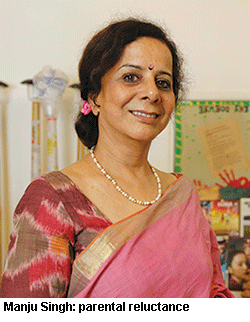
The fact that there’s a huge life skills teaching-learning deficit in our school curriculums, is indisputable.
According to a nationwide research survey titled Developing the Indian Standards for Social & Emotional Learning Framework (I-SELF) 2012-2019 of the Bangalore-based The Teacher Foundation (TTF, estb. 2002), a non-profit teacher training and development organisation, 42 percent of class IV-VIII students and 36 percent of class IX-XII countrywide have experienced interpersonal conflicts such as bullying, physical assault and verbal abuse.
There is glaring lack of awareness among educators as well as parents about the need to invest in the social-emotional development of children to prepare them to deal with failure, relationships, sexuality, exam fears, rejection, peer pressure and stress. Though the National Curriculum Framework 2005 highlighted life skills as critical to the learning process, no specific guidelines have been framed to integrate them into school curriculums. Our I-SELF guidelines are a roadmap for schools to develop the self-awareness, self-management, social awareness, relationships management and decision-making skills of children to enable them to build and sustain productive relationships in school, at home and in their future workplaces,” says Maya Menon, an alumna of Delhi and Leicester (UK) universities, and founder-director of TTF which has trained 72,000 teachers from 2,400 schools across the country during the past 15 years.
Anustup Nayak, a highly-qualified alum of the Georgia Institute of Technology and Harvard School of Education and vice president of the Bangalore/Singapore-based XSEED Education Pvt. Ltd, the well-reputed company which has shaken up Indian K-8 education with its innovative XSeed school learning programme, believes that introducing well-designed life skills learning programmes is a “survival necessity rather than an option” for school managements.
“All self-respecting schools need well-conceptualised curriculums incorporating analytical skills to enable students to process information creatively to solve real-world problems. Secondly, 21st century children must have the awareness and ability to practise environment preservation and support existing life-systems. And finally they need to be equipped with the sensitivity to make ethical choices. Moreover, children must be trained to value cultural differences, manage conflict and build healthy relationships. School curriculums that equip young people with the skills to become employable, aware of their environment and develop the capability to make reasoned ethical choices are institutions that will survive and prosper,” says Nayak.
Clearly, education pundits and leaders are unanimous. The days when high academic grades were the ultimate in education are over. Admittedly, high grades and deep knowledge will help youth go places. But average grades combined with well-developed life skills will get them to the top.
|
21st century skills framework
The Washington-based Partnership for 21st Century Learning (estb.2002), an “advocacy organisation focused on infusing 21st century skills into education,” has developed a detailed framework highlighting the skills and knowledge children and youth need to succeed in work, life and citizenship in the new millennium. This framework has been downloaded by 1.5 million users including educators and schools in the US and worldwide. Salient features of the framework are:
Content knowledge & 21st century themes. Mastery of fundamental subjects and 21st century themes are essential for new millennium students. Disciplines include English, reading, world languages, mathematics, economics, science, geography, history, government and civics.
In addition, schools must move beyond basic competency by weaving 21st century interdisciplinary themes into the curriculum, viz, global awareness; financial, economic, business and entrepreneurial literacy, and civic, health and environmental literacy.
Learning and innovation skills. Sharp focus on creativity and innovation; critical thinking and problem-solving; communication and collaboration is also necessary.
Information, media and technology skills. To be effective in the 21st century, citizens and workers must be able to create, evaluate, and effectively utilise information, media and technology.
Life and career skills. Students need to develop thinking skills, content knowledge, and social and emotional competencies to navigate complex life and work environments. P21’s prescribed life and career skills are: flexibility and adaptability, initiative & self-direction; social & cross-cultural skills; productivity & accountability; leadership & responsibility.
At its 2016 annual conference in Davos, the World Economic Forum released The Future of Jobs Report prescribing the employment, skills and workforce strategy for the future. The report, which surveyed chief human resources and strategy officers of leading global employers, lists the Top 10 skills required to succeed in 2020 workplaces. They include problem-solving, critical thinking, creativity, people management, collaboration, emotional intelligence, judgement and decision-making, service orientation, negotiation skills and cognitive flexibility.
|
With Sruthy Susan Ullas (Bangalore)